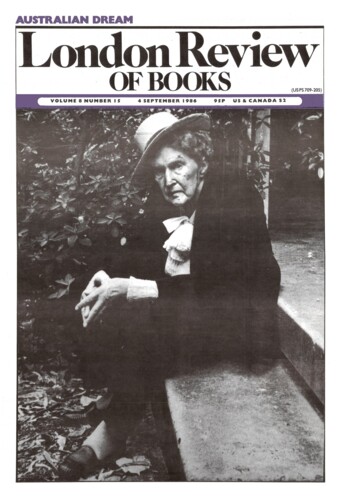To Clive James
Trapdoor
The origin of metaphor is strange.
As boys we used (but don’t let me forget
I only watched, I wasn’t very brave)
To put two spiders in a bottle, wave
It over flame, which usually made them fight,
Or flood them from their deep holes for a change.
These were the deadly trapdoors whose one bite
Sent an inclusive poison racing through
Your veins: I think we thought the risk absolved
Us from all guilt, our cruelty dissolved
In danger. I used my fear of football to
Ward off death fears in the dorm at night.
And then I thought of dying on the field
When someone passed the ball to me. I say,
When challenged to declare what virtue I’d
Like most to have, ‘It’s too late now to hide
From balls and tackles, you can’t get away;
If I’d had courage, I’d at least have squealed.’
We are shut out of our own universe.
Perhaps the spiders in the bottle howled
Or cursed those lumpen schoolboy gods of theirs
Or practised spider jests upon the stairs
Where tyrants crack because one wit has scowled.
We fume and Rupert Murdoch’s none the worse.
And writing in this corset stanza may
Be nothing more than flying in the face
Of new technology. And now they’re topping
Up the latest tank of history at Wapping –
A metaphor is when you have one space
To fill and all of life to file away.
Most metaphor, as Kipling guessed when he
Made Shakespeare witness as a child the end
Of kittens at a sister’s hand, is home-
produced. The tribal creature is alone
With only tribal words to help him blend
His uncloned self with all humanity.
But metaphor is often out of date.
I find a powerful trope: ‘the straitjacket
Of all our childhoods’, but I’ve never seen
A straitjacket – drugged, behind a screen,
The madman of today can raise a racket
And none of it will reach the ears of state.
We live on dead skin of the mind. To write
Is to commit oneself to the past tense
Within the present act of mixing words
Whose immanences settle as occurreds:
And so we pay with pence those bills in cents
And stoke a micro-chip with anthracite.
The language will not move except to laugh
At Big and Little Enders, Old v. New –
Thus pedantry is publishing a stricture
While TV Gnomes are ‘massaging a picture’,
The dictionary hasn’t got a clue,
The wind blows out the door both wheat and chaff.
The long relays of childhood can provide a
Range of wrongs to stake a moral claim.
The lie of words (O ambiguity!),
The rust of rhyme, short-cut of simile,
Make yours and mine and Swift’s desire the same –
The angry soul is quite a bottled spider.
Redback
My next portmanteau-spider is a cert
To raise Australian hackles (and bare bums
Off dunny seats): the Redback scuttles out
From underneath your fallen strides to scout
The scene. You always wonder what becomes
Of him when brooms and Lysol lay the dirt.
But let the Redback be my image of
The naturally malevolent activist,
The dried-blood cross upon his back be rubric
Of the Unsettled Terrorist, his Kubrick
Horror-sequence of a bite demist
The mirror of normality at Sydney Cove.
Unlike the Trapdoor he is quite at home
In human homes. Communications architecture
Suits his way of feeding on the grid
Of everyday existence. He stays hid
In myriad corners, happily the vector
Of challenges from brushed velour to chrome.
I’d like to think that he was waiting there
When that initial cargo of strong rum
And human refuse hit Australia’s shore.
To flog, to dream, to endlessly explore
Might make Arcadia of a rural slum:
The Redback gave the hedonists a scare.
‘Simply the thing I am shall make me live.’
Bravo, the Redback! But he stands for more.
That some shall live, some others have to die,
What my will urges, your will must supply –
The Crowded Ark’s the spider’s metaphor:
He has to eat, and then he will forgive.
And he survives the change of gear which
Pulls Australia from remote back number
To Brave New World of Opportunity.
His atavism’s there for all to see,
Devoid of any Panglossian lumber,
A backyard warning to the newly rich.
Especially as we’ve tamed the whole wide land
To seem Pelagian peninsula
Where terrors have a user-friendly feel.
The bush looks Art Nouveau, the wattles steal
Their hazy shapes from Mucha; in the car
The Esky waits the barbecue’s command.
No doubt the mainframe’s large enough to cope
With sharks and bushfires, droughts and mining rights.
The people have been told they’re legatees
Of freedom lovers from five centuries:
They’ve made stigmata of their appetites
And trust in God and in their horoscope.
The Redback understands. He’s his own priest
And has an Opus Dei in each leg
To speed him to the necessary prey.
Perhaps he likes to keep Australia Day
Among the stacks of stubbies and the keg,
And wave the Southern Cross above the feast.
He has no need of words, a true numbskull.
He will evolve no further, like the shark,
But at cohabitation is a whizz.
How subtle this philosophy of his,
To warn us, as we fumble in the dark,
Relieving Nature won’t be comfortable.
Send Letters To:
The Editor
London Review of Books,
28 Little Russell Street
London, WC1A 2HN
letters@lrb.co.uk
Please include name, address, and a telephone number.

